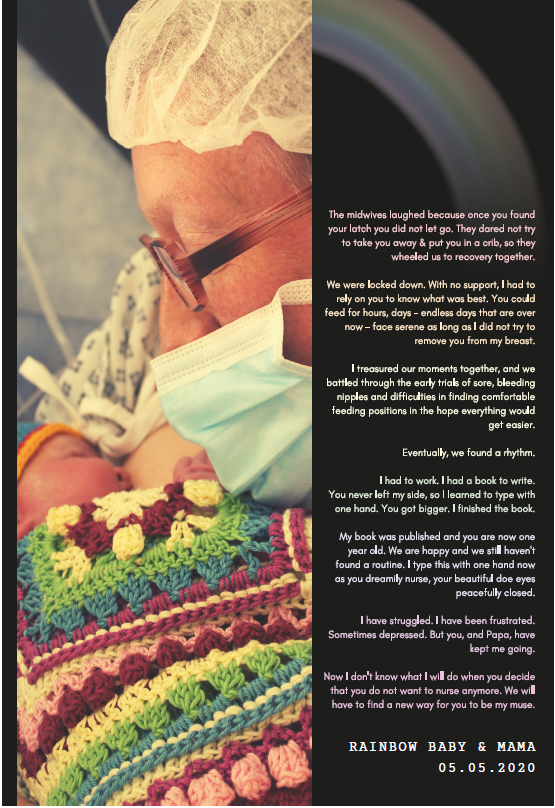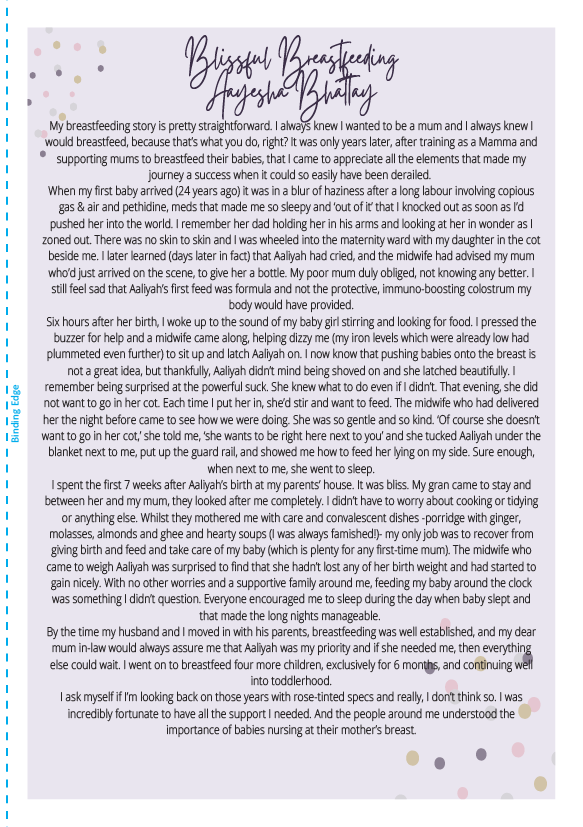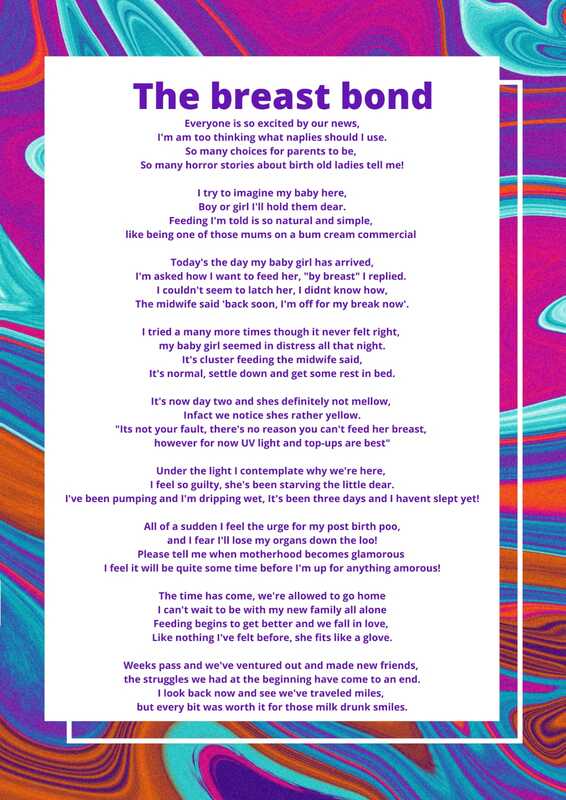|
This post was initially posted in 2017 at: www.tommys.org
This blog was written by Sally Etheridge IBCLC as a guest blog post for Tommy's https://www.tommys.org Tommy's fund research into miscarriage, stillbirth and premature birth. For many women who may have had a difficult previous experience, the desire to breastfeed is very strong. However, the fear of not achieving this goal can make it hard to know what to do and how to prepare. Why breastfeed? During pregnancy, it’s natural to focus on the labour and birth. However, enjoying feeding your baby is the foundation of your relationship together, so seeking information and thinking about your support network is actually a very important part of the preparation for birth. You’ve probably heard that breastfeeding is ‘best for babies’ because, among other things, it:
Like any new skill, breastfeeding takes time to get the hang of. Your greatest ally in developing this new skill is patience with yourself and your baby. Keeping your baby really close, not just in the first hour after birth but also in the hours and days following their arrival, allows you to get to know them, to pick up on their cues and to let your mothering instincts kick in. Remember, your body has grown this baby, given birth to this baby and now it is ready to nurture him or her. Attending a local antenatal breastfeeding class is great, as they are often attended by breastfeeding peer supporters, allowing you to find out what is available near you. Breastfeeding goals You may have learned you need an induction, a caesarean section, or be facing something else that makes you fear that breastfeeding will be more challenging. While every mother and baby’s birth and journey is individual to them, there are things that can help everyone meet their breastfeeding goals, and ensure you and your baby enjoy a close and loving feeding relationship. Breaking down the barriers and figuring out where to start Talk to your midwife and ask questions Talk to your care team so they know how important breastfeeding is to you and your baby, and explore together how any barriers may be removed and overcome. If you have questions, always ask. If you need some extra support, then say. Check whether your local hospital has Unicef Baby Friendly accreditation. These hospitals have been assessed to make sure they have a culture where breastfeeding is encouraged and supported, and where policies and training are in place to protect and promote best practice. ‘I was so grateful to be in an environment where I was constantly helped to learn how to breastfeed. I couldn’t do it without help at first, but by the time I left I had the confidence to feed my baby at home on my own – and it has been easy ever since!’ Lily Cole on the help she received at Baby Friendly accredited St Thomas’ Hospital Write a post-birth plan Talk about your wishes for your baby with your (birth) partner. It can be hard to speak up for what you want when you have just had your baby so having a plan in place can really help. Your birth partner’s voice, along with the plans you have prepared, may be crucial to getting the support you want, how you want it. Local support groups Write down or save on your phone the numbers for breastfeeding support locally, along with the national helpline number 0300 100 0212. Give yourself time and space Talk to your family about your wishes too. Think about what visitors you want, and how to keep these special early days calm, private and unhurried. Skin to skin Skin to skin contact straight after delivery, or as soon as possible after, for at least an hour undisturbed allows you and your baby to rest together and have time to adjust. Enjoy this time together There are as many ways to enjoy nurturing your baby through feeding as there are mums and babies. Understanding the issues alongside sensitive trained help and a clear action plan, means most babies, whatever their initial challenges, can go on to breastfeed happily. This is a special time for you and your baby, so treasure it. This second instalment from lactation consultant, Sally Etheridge, helps you understand baby’s first feed and colostrum. She also offers information about feeding a baby that might have arrived a little bit early (34-37 weeks) This post first appeared in 2017 at www.tommys.org
The first feed Most babies will seek the breast and take their first feed in the first hour. However, some babies may take longer, especially if birth has been complex, lengthy, or involved interventions. You may need more support or trained help until things are on-track. Colostrum All new mothers produce colostrum, the first milk that is made from around halfway through the pregnancy. Sometimes known as the baby’s first immunisation, it is full of protective qualities that prepare and prime the baby’s delicate gut. Produced in very small amounts to suit your new baby’s tiny tummy, with unrestricted time close to you, they will get just what they need. Lots of cuddling and skin to skin in the early days can help ensure your baby learns how to get comfortable and enjoy plenty of time grazing and suckling. This way, when your milk ‘comes in’ around the third or fourth day after the birth, the transition to more milk and fuller breasts will happen most easily. If your baby is taking a little longer to start breastfeeding, ask for help from staff to express your colostrum early and often. The drops you express can be given to your baby by syringe, while you continue with skin to skin to allow your baby to smell and feel your skin, lick and taste your milk. Where breastfeeding has yet to take-off, frequent expressing is important for a good milk supply later. Storing your colostrum For parents who know they may need extra help with starting breastfeeding, antenatal collection, or ‘harvesting’ of colostrum may be the answer. Hand expressing your colostrum beforehand, collecting the droplets in a syringe and freezing it ready for your baby after the birth can really help take off the pressure. Ask your midwife what your hospital protocol is. Visit the La Leche website for more information about antenatal collection of colostrum or download Kingston Hospital’s handy PDF guide. Breastfeeding if baby has arrived a little earlier than expected One group of babies who may receive less support to start breastfeeding, but may need it most, are those babies born at 34-37 weeks; the Late Preterm babies. These babies may not need to go the NNU. They may stabilise quickly, and be discharged after a few days of observation. Yet these babies, and their parents, often need trained help and ongoing support to get breastfeeding established. They are usually small, with little mouths. They may tire easily, fall asleep after a few sucks, and so take little milk in. Their ability to sustain and coordinate sucking will take some time still to develop. Without guidance and support, parents may not be aware their baby is not feeding effectively. Others may start to give bottles of formula milk, unsure how else to make sure their baby is ‘getting enough’. Parents can feel tremendous guilt if they are told their precious baby has lost too much weight, or needs to go back in to hospital due to jaundice, and may quickly decide breastfeeding is too stressful or difficult. Recognising the signs that a baby is getting enough milk is important for all parents. Watch your baby for any signs that they are ready to feed, to give yourself time to bring your baby close to the breast, and allow them to latch on well; get to know the signs your baby is actively drinking, and relax together with your baby. It is natural for parents to take a great interest in their baby’s nappies! This is a great way to know if your baby is likely to be getting enough milk. See NCT for a useful visual guide to what to look for and expect. A wonderful resource with numerous short videos for breastfeeding parents, including breastfeeding a small or early baby, can be found at www.globalhealthmedia.org. Why we’re celebrating World Breastfeeding Week and the theme of sustainabilityBreastfeeding is what mothers and babies do all over the world, and have done across the millennia. It is what has ensured the survival of the human race. Every single one of us is proof that breastfeeding works – without it, none of us would be here today. Right now, in every town and country, and in every corner of the globe, mothers are nurturing their baby with their milk. Breastfeeding is the most efficient food production system we know and it gives all babies an equal start in life. |
AuthorMammas Peer Supporters, Mothers who use our services, Directors and our trusted friends all contribute to this blog. Archives
May 2022
Categories
All
|
Proudly powered by Weebly




 RSS Feed
RSS Feed